(新人教版)八年级英语下册 Unit 9 (Section A 3a-4c)导学案
- 格式:doc
- 大小:55.50 KB
- 文档页数:2
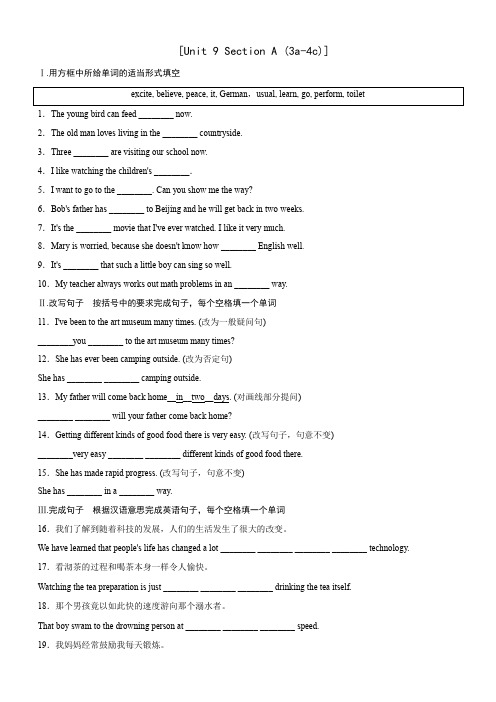
[Unit 9 Section A (3a-4c)]Ⅰ.用方框中所给单词的适当形式填空1.The young bird can feed ________ now.2.The old man loves living in the ________ countryside.3.Three ________ are visiting our school now.4.I like watching the children's ________.5.I want to go to the ________. Can you show me the way?6.Bob's father has ________ to Beijing and he will get back in two weeks.7.It's the ________ movie that I've ever watched. I like it very much.8.Mary is worried, because she doesn't know how ________ English well.9.It's ________ that such a little boy can sing so well.10.My teacher always works out math problems in an ________ way.Ⅱ.改写句子按括号中的要求完成句子,每个空格填一个单词11.I've been to the art museum many times. (改为一般疑问句)________you ________ to the art museum many times?12.She has ever been camping outside. (改为否定句)She has ________ ________ camping outside.13.My father will come back home__in__two__days. (对画线部分提问)________ ________ will your father come back home?14.Getting different kinds of good food there is very easy. (改写句子,句意不变)________very easy ________ ________ different kinds of good food there.15.She has made rapid progress. (改写句子,句意不变)She has ________ in a ________ way.Ⅲ.完成句子根据汉语意思完成英语句子,每个空格填一个单词16.我们了解到随着科技的发展,人们的生活发生了很大的改变。
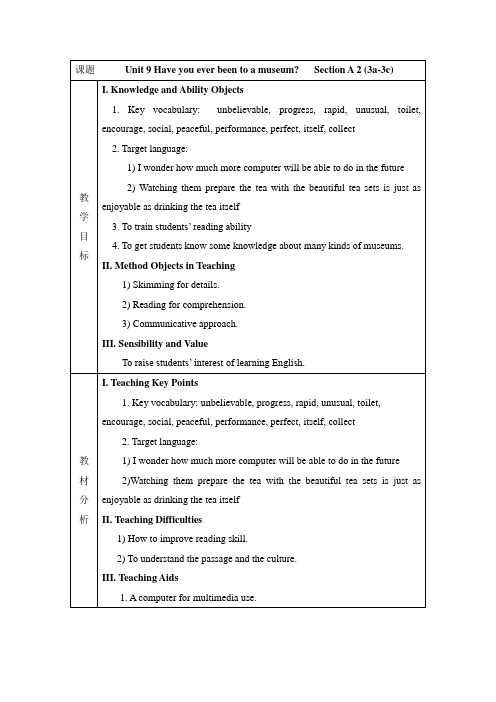

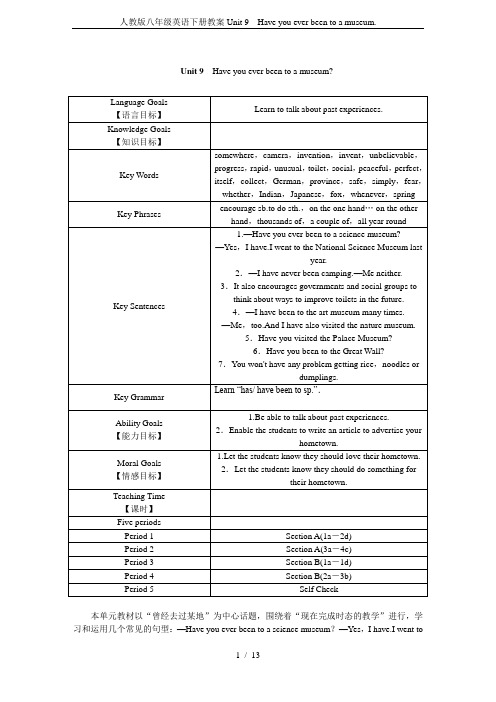
Unit 9Have you ever been to a museum?本单元教材以“曾经去过某地”为中心话题,围绕着“现在完成时态的教学”进行,学习和运用几个常见的句型:—Have you ever been to a science museum?—Yes,I have.I went tothe National Science Museum last year./—I have never been camping.—Me neither./It also encourages governments and social groups to think about ways to improve toilets in the future./—I have been to the art museum many times.—Me,too.And I have also visited the nature museum.等。
在学习过程中,学生在交流中,能促进师生之间的感情。
Section A主要学习几个常见的动词短语及句型Have you been to…?应掌握句型:—Have you ever been to a science museum?—Yes,I have.I went to the National Science Museum last year.等。
通过一篇短文介绍了学生们曾经去过的最有趣的博物馆,增加了学生的阅读量。
Section B安排了听、说、读、写的任务,通过短文“Singapore—A Place You Will Never Forget!”介绍了新加坡的一些情况。
教师在教学中应合理利用课本上的知识进行教学。
第一课时Section A(1a-2d)Teaching Key Points【教学重点】The vocabulary:amusement,somewhere,camera,invention,history/space/art museum,put up,have a good time,water/amusement parkTarget language:1.—Have you ever been to a science museum?—Yes,I have.I went to the National Science Museum last year.2.I have never been camping.3.It's a great way to spend a Saturday afternoon.Teaching Difficult Points【教学难点】Use the target language above to talk about past experiences.Teaching Aids【教学工具】an English book,a tape recorder and CAITeaching Steps【教学过程】★Step 1Preview and perception【预习感知】Ask the students to read the vocabulary and target language.Ⅰ.英译汉。
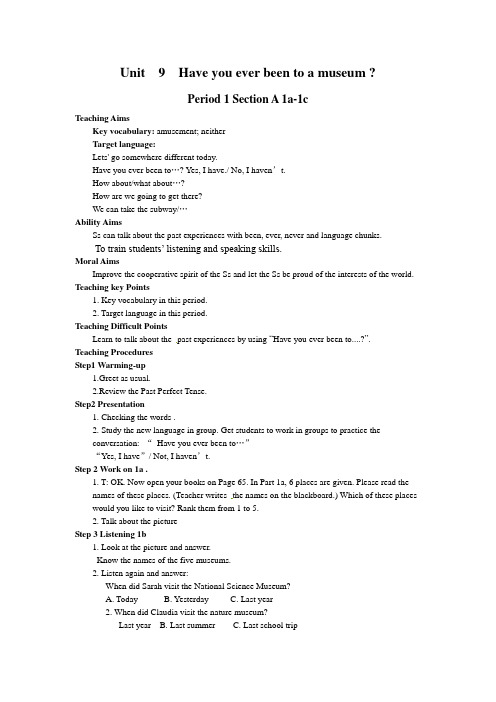
Unit 9 Have you ever been to a museum ?Period 1 Section A 1a-1cTeaching AimsKey vocabulary: amusement; neitherTarget language:Lets' go somewhere different today.Have you ever been to…? Yes, I have./ No, I haven’t.How about/what about…?How are we going to get there?We can take the subway/…Ability AimsSs can talk about the past experiences with been, ever, never and language chunks.To train students’ listening and speaking skills.Moral AimsImprove the cooperative spirit of the Ss and let the Ss be proud of the interests of the world. Teaching key Points1. Key vocabulary in this period.2. Target language in this period.Teaching Difficult PointsLearn to talk about the past experiences by using “Have you ever been to....?”.Teaching ProceduresStep1 Warming-up1.Greet as usual.2.Review the Past Perfect Tense.Step2 Presentation1. Checking the words .2. Study the new language in group. Get students to work in groups to practice theconversation: “Have you ever been to…”“Yes, I have”/ Not, I haven’t.Step 2 Work on 1a .1. T: OK. Now open your books on Page 65. In Part 1a, 6 places are given. Please read thenames of these places. (Teacher writes the names on the blackboard.) Which of these places would you like to visit? Rank them from 1 to 5.2. Talk about the pictureStep 3 Listening 1b1. Look at the picture and answer.Know the names of the five museums.2. Listen again and answer:When did Sarah visit the National Science Museum?A. TodayB. YesterdayC. Last year2. When did Claudia visit the nature museum?Last year B. Last summer C. Last school trip3. What may the relationship be between the two speakers?A. FriendsB. Teacher and studentC. Mother and kid .Listen and repeat.3. Listen and check.4.Follow the tape.Step 4 Pair work.1. Example :A: Let’s go somewhere different today.B: OK. Where do you want to go?A: Have you ever been to the spacemuseum?B: No, 1 haven’t. How about you?A: A: Me neither. / Neither have I.2. Students work.Step 5板书设计Unit 9 Have you ever been to a museum?Section A (1a-1c)Has been to/has gone toMe neither.Neither have I.Have you ever been to a museum?Yes,I have.No,I have not.Step6 Homework.plete the exercises.2.Preview the next period.。
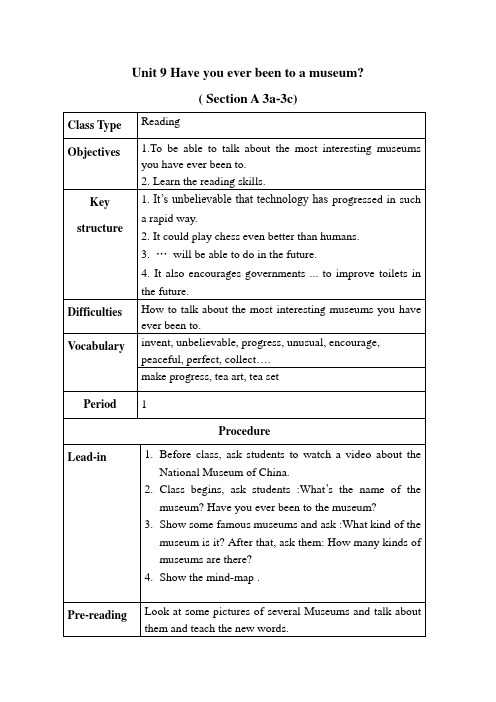
人教版新目标初中八年级英语下册Unit9 Have you ever been to a museum?Section A(3a-3c)教学设计梅州市大埔县华侨第二中学刘俊波一、教材分析本节课的教学内容是人教版新目标八年级英语下册第9单元的第二课时,即Section A(3a-3c)。
本单元围绕谈论好玩的地方开展多种教学活动,学会运用Have you ever been to …?这个句型来询问别人的经历,谈论曾经去过的地方。
其语法项目主要是学习现在完成时态的用法。
本节课是一堂阅读课,文章通过三个学生的分别叙述,呈现了三种不同特色的博物馆,并利用以前学习过的一般过去时态和前一节课学习的现在完成时态句型进行课文阅读,进一步加深对目标语言的理解和运用,提高学生阅读能力和综合语言运用能力,并为往后进一步学习过去完成时做一个良好的铺垫。
二、学情分析该班为八年级学生,他们活泼,好奇心与求知欲望强。
同时,经过该单元第一课时及本课的学案预习,他们已经对现在完成时、新词汇及博物馆相关话题有了初步了解,他们的语言学习热情也在逐步增加,为该课的学习做好了充足的语言准备。
因此,通过本课的各种教学活动,帮助学生们更好地掌握重点词汇用法,引导学生们用英语介绍他们所搜集的相关博物馆的信息,鼓励每一位学生参与到课堂活动中去,使学生产生“跃跃欲试”的冲动,享受成功的喜悦。
三、教学目标1、知识目标1) Learn&Use the new words: invent, progress, rapid, unbelievable, unusual, encourage, improve, peaceful.2) Learn&Use the new phrases:... as adj./adv.原级as... , in such a rapid way, encourage sb. to do.2、能力目标1)Learn the reading strategy:read the first sentence of each paragraph for the main idea of the whole passage.2) Learn to talk about the places Ss have been to in English.3、情感目标1) Let Ss know the meaning of museums in their study and life and encourage Ss to visit museums in their free time.2) Educate students to care about things around them.四、教学重难点1、教学重点1) New words:invent, progress, rapid, unbelievable, unusual, encourage, improve, peaceful.2) New phrases:... as adj./adv.原级as... , in such a rapid way, encourage sb. to do结构。
Section A 单词camera n.照相机;摄影机;摄像机unbelievable adj.难以置信的;不真实的progress v.&n.进步;进展rapid adj.迅速的;快速的unusual adj.特别的;不寻常的toilet n.坐便器;厕所encourage v.鼓励social adj.社会的peaceful adj.和平的;安宁的perfect adj.完美的;完全的itself pron.它自己collect v.收集;采集German adj.德国的;德语的;德国人的n.德语;德国人ride n.供乘骑的游乐设施;短途旅程province n.省份amusement n.娱乐;游戏somewhere adv.在某处;到某处invention n.发明;发明物invent v.发明;创造performance n.表演;演出theme n.主题短语amusement park游乐场lead to导致put up搭起think about考虑make tea沏茶tea art 茶艺tea set茶具equator n.赤道短语take a holiday度假three quarters四分之三at night在夜晚all year round全年be close to 靠近be far from远离……thousands of 数以千计的;许许多多的whether…or…不管……还是……on the one hand…on the other hand…一方面……另一方面……句型1.On the one hand,more than three quarters of the population are Chinese,so you can simply speak Putonghua a lot of the time. On the other hand,Singapore is an English-speaking country,so it’s also a good place to practice your English! 一方面,超过四分之三的人口是华裔,因此很多时候你可以只说普通话。
Unit 9 Have you ever been to a museum
学习目标:
1.学会本课的基本词汇unbelievable, progress, rapid, unusual, toilet, encourage, social, peaceful, performance, perfect, itself, collect及目标语言1) I wonder how much more computer will be able to do in the future2) Watching them prepare the tea with the beautiful tea sets is just as enjoyable as drinking the tea itself
2.锻炼阅读能力。
3.帮助学生了解何种博物馆的知识。
4.学习策略:采用任务型教学模式,把主要学习任务布置给学生,明确任务后,教师提供相关的语言,帮助学生在完成任务的过程中形成主动学习的习惯。
通过句型
操练、听力训练,培养学生实际应用英语的能力。
当堂测评分层达标
基础落实★
单项选择
( )1.My mother often encourages me________English as much as possible.
A. speak
B. speaks
C. speaking
D. to speak
( )2.—Do you often ___ your pen friend? --Not very often.
A. hear from
B. hear about
C. hear of
D. hear
( )3.Neither of the two boys______from the USA.
e
B. don’t come
es
D.doesn’t come
( )4.Have you ever seen him____?
A. ago
B.two days ago
C.before
D.just now
( )5.His brother ______ for three months.
A. has joined the army
B.has been in the army
C. has become a soldier
D.joined the army
( )6.Did you go there by ____bike?
A. a; a
B./; a
C.the; the
D.a; the
( )7.There has never been such a beautiful village ____in the world.
A. anywhere
B. everywhere
C. somewhere
D. nowhere
( )8.-What kind of house would you like ?
-I’d like ____with a garden in front of____.
A. it; one
B. one; one C one; it D. it ; it
( )7.She has never been to the city , ____she?
A. doesn’t
B. hasn’t
C. has
D.haven’t
( )8. –It’s Father’s Day, ____ ?
-Yes,Let’s buy a gift for Dad..
A. isn’t it
B. dosen’t it C isn’t he D.doesn’t he
( )9.Juile’s father____to London last month.He____there three times.
A. went; had gone
B. has gone; has been C went; has been D. has been; had gone
( ) 10. I don’t like those two coats because ________ of them fits me.
A. either
B. neither
C. none
D. all
( ) 11. ––I really want to go to the . How about you?
–– So do I. We can swim in it.
A. water park
B. aquarium
C. zoo
D. space museum
( ) 12. ____ is fun to learn another language.
A. That
B. This
C. It
D. What
( )13. ––I hear your teacher ________ to Japan once. ––Yes, he _______ there last year.
A. goes; went
B. has been; has been
C. went; went
D. has been; went
( ) 14. –– _______ have you been studying English? –– Since last year.
A. How far
B. How soon
C. How long
D. How often
( ) 15. The Smiths have lived here with us ________ 1999.
A. for
B. since
C. before
D. in
( ) 16. –– I have never been to Disneyland. How about you? ––.
A. Me, too
B. So do I
C. Me, neither
D. Yes, I have
( )17. When my mother came back home last night, I was still _________.
A. wake
B. woke
C. waking
D. awake
( ) 18. ––Tina, we are going to take a holiday in Europe. ––_________.
A. It’s wonderful
B. With pleasure
C. That’s OK
D. Have a good time
所给词的适当形式填空
1. Have you ever _______________(study) with more than three fri ends?
2. Has Tom ever ______________(travel) to China?
3. Have you ever_________(say) something you didn’t want to say?
4. I have never _____________(argue) with my parents.
5. I ____________(go) to the space museum last year.
6. Harvey____________(have) a great time at the Water World.。